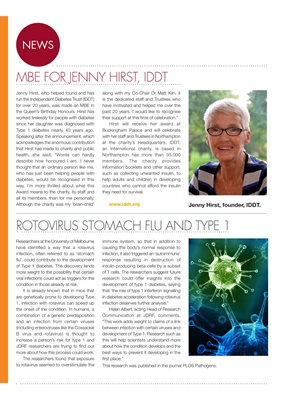
NEWS
Jenny Hirst, who helped found and has
run the Independent Diabetes Trust (IDDT)
for over 20 years, was made an MBE in
the Queen's Birthday Honours. Hirst has
worked tirelessly for people with diabetes
since her daughter was diagnosed with
Type 1 diabetes nearly 40 years ago.
Speaking after the announcement, which
acknowledges the enormous contribution
that Hirst has made to charity and public
health, she said, "Words can hardly
describe how honoured I am. I never
thought that an ordinary person like me,
who has just been helping people with
diabetes, would be recognised in this
way. I'm more thrilled about what this
Award means to the charity, its staff and
all its members, than for me personally.
MBE FOR JENNY HIRST, IDDT
Although the charity was my 'brain-child'
along with my Co-Chair Dr Matt Kiln, it
is the dedicated staff and Trustees who
have motivated and helped me over the
past 20 years. I would like to recognise
their support at this time of celebration."
Hirst will receive her award at
Buckingham Palace and will celebrate
with her staff and Trustees in Northampton
at the charity's Headquarters. IDDT,
an International charity, is based in
Northampton has more than 35,000
members. The charity provides
information booklets and other support,
such as collecting unwanted insulin, to
help adults and children in developing
countries who cannot afford the insulin
they need for survival.
Researchers at the University of Melbourne
have identified a way that a rotavirus
infection, often referred to as 'stomach
flu', could contribute to the development
of Type 1 diabetes. The discovery lends
more weight to the possibility that certain
viral infections could act as triggers for the
condition in those already at risk.
It is already known that in mice that
are genetically prone to developing Type
1, infection with rotavirus can speed up
the onset of the condition. In humans, a
combination of a genetic predisposition
and an infection from certain viruses
(including enteroviruses like the Coxsackie
B virus and rotavirus) is thought to
increase a person's risk for type 1 and
JDRF researchers are trying to find out
more about how this process could work.
The researchers found that exposure
to rotavirus seemed to overstimulate the
immune system, so that in addition to
causing the body's normal response to
ROTOVIRUS STOMACH FLU AND TYPE 1
infection, it also triggered an 'autoimmune'
response resulting in destruction of
insulin-producing beta cells by a subset
of T cells. The researchers suggest future
research could offer insights into the
development of type 1 diabetes, saying
that 'the role of type 1 interferon signalling
in diabetes acceleration following rotavirus
infection deserves further analysis.'
Helen Albert, acting Head of Research
Communication at JDRF, comments,
"This work adds weight to claims of a link
between infection with certain viruses and
development of Type 1. Research such as
this will help scientists understand more
about how the condition develops and the
best ways to prevent it developing in the
first place."
The research was published in the journal PLOS Pathogens.